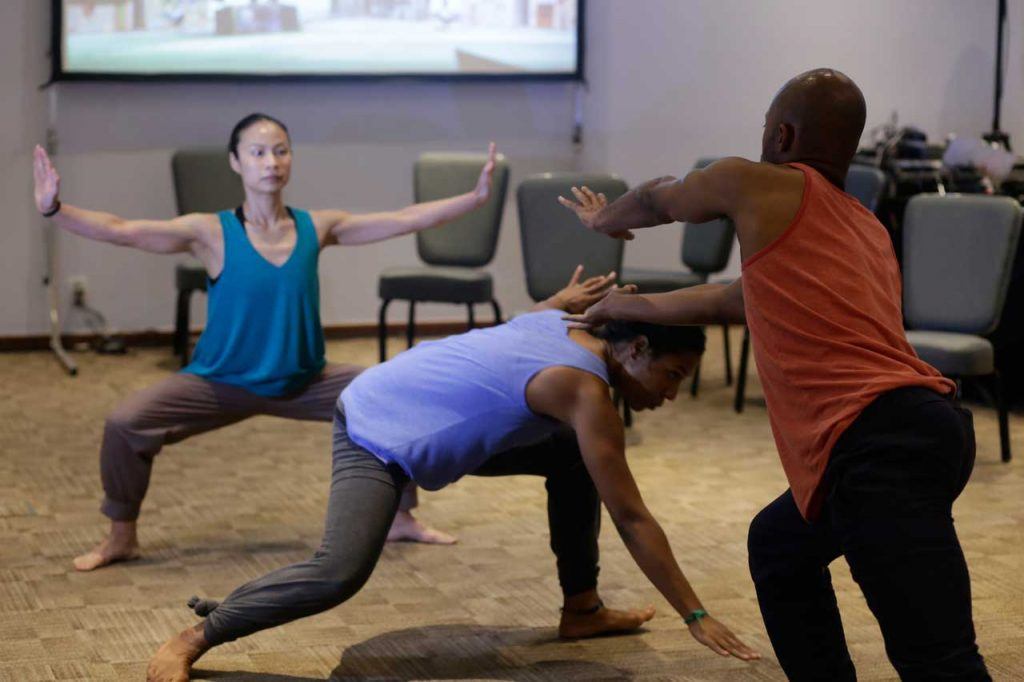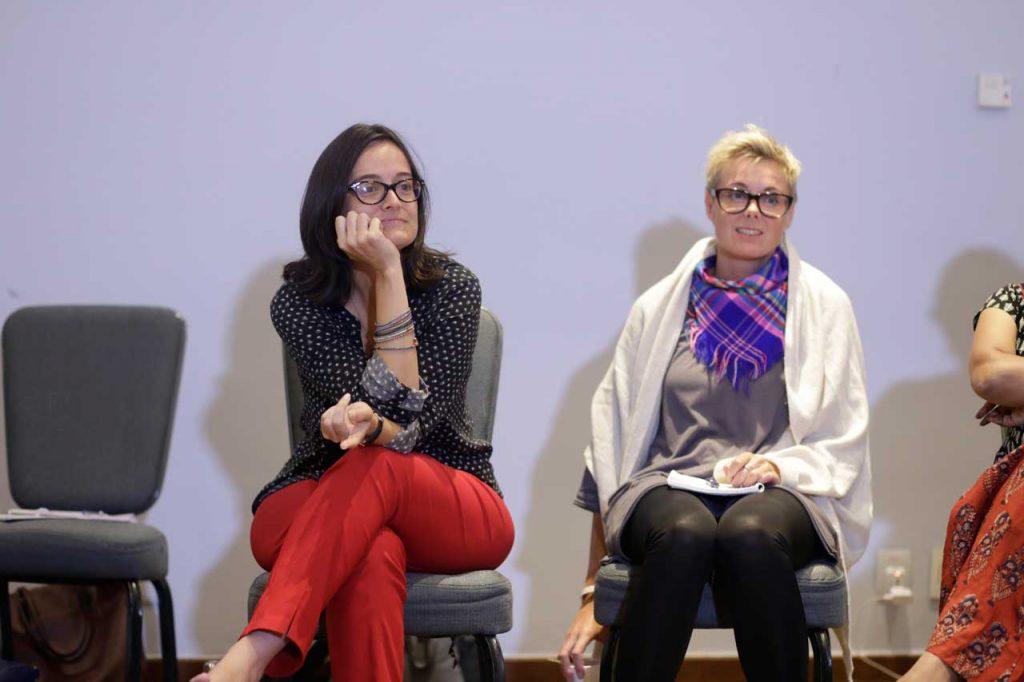It can be difficult to offer sexuality education to adolescents anywhere—but it’s especially difficult in deeply conservative communities around the world, where sexuality remains a taboo topic. At “Let’s Talk About Sex,” a day-long event organized by GreeneWorks, American Jewish World Service, CARE and International Women’s Health Coalition, participants got an opportunity to explore this challenge through a mix of discussion, movement and performance.
It was a unique way to kick off the 2016 Association for Women’s Rights in Development (AWID) forum, which brought together feminists—1,800 of them, from more than 30 countries—to strategize and connect in Bahia, Brazil this September. Among the participants were representatives from AJWS grantee organizations working to advance gender equality in India.
“As researchers and practitioners, we often operate inside our heads,” said Meg Greene of GreeneWorks. She noted that many people working with international nonprofit organizations tend to resist meaningful discussions of sexuality out of sheer discomfort. “This is a very embodied challenge . . . what can we learn by embodying our experience of it?”
Margot Greenlee of BodyWise Dance began the day by leading the group through a series of warm-up exercises set to samba. Participants drummed on their knees and moved to the music. One woman remarked that the experience was “better than coffee,” and it was followed by a discussion of the reasons why everyone had come.

One participant said her work with adolescent girls, while deeply meaningful, was sometimes sad and frustrating—in part because the girls were reaching an age when sexuality was becoming part of their lives, and she often felt it impossible to discuss their questions without risking anger from the community. Another woman agreed; she explained that even when her organization tried to educate young people on sexuality, the curricula wound up focusing more on topics related to anatomy and hygiene, like menstruation. She and others wanted to explore new strategies for addressing sexuality more openly.
The rest of the day alternated between performances by the BodyWise company, participatory dance exercises and more cerebral reflections on participants’ respective work. Conversation started off with the social norms and experiences that shape people’s understanding of sexuality and gender roles—and how some people’s beliefs lead to serious barriers that keep girls and young women from exercising their rights.
For example: Alejandra Colom, who works with Population Council, talked about a rural community in Guatemala that’s ruled by drug traffickers. She said many people there view early and child marriage as something that happens simply because, in their view, “it’s the only way to stop bad things that happen to girls.” The community thinks of marriage as a way of increasing the security of girls in a place where sexual violence is commonplace.

To begin expanding the options and information available to local girls, Population Council hired a young woman who served as a mentor. She met with about 40 girls once a week and spoke to them about topics like sexuality and gender-based violence. Alejandra said the mentor wanted girls to understand their rights—to know that “it’s not normal that if you pass man on road and he fancies you, he thinks he has the right to rape you.”
Once the community heard what she was teaching, Alejandra said, some of the men started proclaiming the education she provided “dangerous.” The real message: women who stand up for their rights will face danger. Young men started harassing the mentor and interrupting her class. One day, a truck followed behind her motorbike, pulling closer and closer. Then the men inside opened fire.
The bullets missed the mentor. But her days with that community were through. She decided not to go to the police. Everyone knew the drug traffickers were ruling the area, not the government. Alejandra said the young woman told her: “The moment they know that I’m doing something about this, they’ll come back and kill every single member of my family.”
This was just one example of the many challenges the group shared. The conversation also unearthed the strategies participants use to continue their work in places that don’t exactly welcome it. Several people at the event spoke about how collectives—organized groups of girls who learn to advocate for their rights together—can be so important for negotiating with communities when tough situations arise. They reminded the group that there’s power in numbers.
On the other hand, participants pointed out, girls need the freedom to make the decisions that are best for their individual situations. In many places, that means choosing between a few very limited options. Archana Dwivedi of Nirantar—an AJWS grantee—spoke about her organization’s research in India, which found that many teenage boys and girls are actually choosing to get married. They often view early marriage as less oppressive than staying at home with their parents, who are incredibly strict.
In order to address the limitations that many girls and young women face, AJWS’s grantees in India are finding ways to increase girls’ mobility and opportunities. Some of them offer computer or English classes because they know this kind of program is accepted by parents; then, the organization discreetly offers sexuality and human rights education to participating girls.
In Archana’s experience, organizations can often withstand community objections to sexuality education by explaining the importance of their work to angry parents and community members, waiting until the tension breaks, and returning to their work in a few months. She noted that organizations who broach topics like sexuality and gender equality with women and girls should expect backlash from conservative communities and prepare accordingly.
“There is always a backlash when you’re working with adolescent girls,” Archana said. “Everyone wants to control them.”
Read more about the connection between early marriage and control of sexuality here.
AJWS’s work in countries and communities changes over time, responding to the evolving needs of partner organizations and the people they serve. To learn where AJWS is supporting activists and social justice movements today, please see Where We Work.

